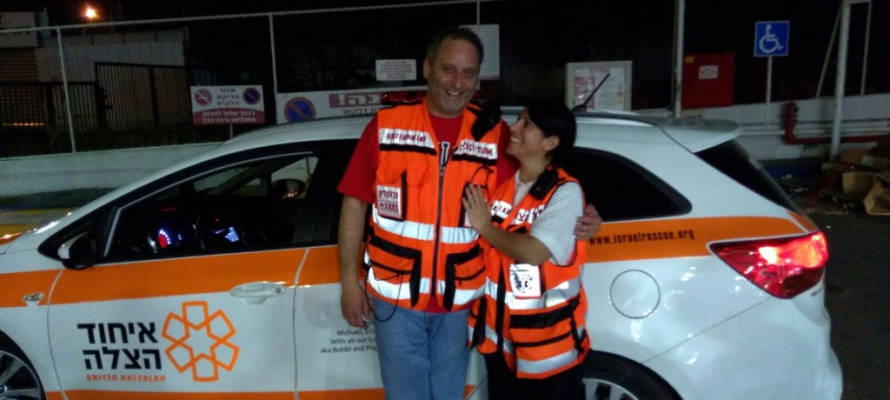Tu b’Av – the 15th day of the Hebrew month of Av – is the Jewish holiday of love, and what better way to celebrate your connection with another person than by saving lives together?
Among the 3,500 volunteers for Israel’s national emergency medical services (EMS) volunteer organization, United Hatzalah, are more than a dozen couples who answer emergency calls and go out on rescue missions together. The couples come from different backgrounds and walks of life, from secular Tel Avivians to ultra-Orthodox Jews living in the periphery. Many have been working together as responders since United Hatzalah began more than 10 years ago, and some span various levels of emergency first response as one spouse is an EMT and qualifies as basic life support (BLS) while the other is many times a paramedic or doctor and qualifies as advanced life support (ALS). While the life of a volunteer EMT (emergency medical technician) can be challenging in unexpected and often eventful ways, it can also create bonds that last a lifetime.
Meeting Your Match While Saving Lives
Eliana and Avner Ben David began volunteering a number of years ago, but not yet as a couple. They met via a Whatsapp group that was set up for the local EMTs. “We talked a lot about some medical details and different cases that we had both seen, which then lead us to a private conversation. A week or so later we spoke on the phone, which eventually led to a date,” said Eliana.
“While we were dating, we kept receiving calls and we answered them together, as we were often together. I had to keep reminding him that these calls were not considered dates,” she quipped.
After some time, Avner invoked his brother’s help to arrange the marriage proposal. As both he and Eliana are avid responders who care about their work, Avner had the dispatch center create an emergency call for just the two of them to arrive in the middle of a park. Instead of seeing a stabbing victim, which had not been real, Eliana arrived shortly after Avner to see a candle-lit proposal, complete with a bottle of her favorite wine and Avner with a ring. The two EMTs got married in May 2014 and they have a two-year-old son.
Eliana was astounded by how much she learned about herself after becoming an EMT and how some rules from the field can be applied to marriage. “You do your best to help where you can, but you can’t always save everyone. You learn so much from the experience of going on calls, about yourself and how to help your partner on scene. When applying that to marriage, it teaches you how to work in high-intensity moments in your relationship. You should always be there to not only solve the problem, but help your partner as well.”
Coping with Raising a Family
As every couple must, the young family has made changes to their routine of going on emergency calls now that there is a toddler to look after at home. “Avner certainly heads out more than I do,” said Eliana. “To create a balance, we have established ground rules for when it is an appropriate time to go out on calls and when it is not. But we do what we can to help save those in need without impacting too much on our family life.”
Kobi and Avigail Brillman live in Kochav Yaakov in the Binyamin region; the town is not located in close proximity to a hospital. Immediate EMS response is something that saves lives continually, and the pair has dedicated their lives to this mission. The couple utilizes Kobi’s ambucycle in order to arrive at emergencies quickly, as their area suffers from constant traffic jams due to car accidents on the one major highway in the region. Avigail’s ALS training as a paramedic allows her to provide the patients with much-needed medical intervention at the scene of the incident, which in many cases comes long before an ambulance can arrive. The couple has two children, and they respond on average to 3-4 emergencies per day. They have a deal with their neighbors who agreed, under these circumstances, to watch the children ,who are both under the age of three.
“Saving lives is together is something that we both love doing. While these are not situations that we hope for in any way, the fact that we can respond together, understand what our spouse needs in the moment while responding and be there for each other after the fact is something that has helped us grow together over the years,” Kobi said.
‘A Family Endeavor’
Racheli and Dovie Maisel respond to emergency calls together in their neighborhood in Ramle. While Dovie has been involved in the world of EMS for over 25 years and is a paramedic, Racheli is a newly graduated EMT. The couple has four children, the oldest of which is mature enough to babysit her younger siblings when the parents need to rush out to an emergency.
“If you’re already going out to an emergency call, then it’s kind of fun to go out with your spouse to see my husband in action during a call in a situation in which I don’t get to see him every day. It gives me a new sense of pride in him, seeing him relate to patients. I was able to learn a lot from him during the shift and it gave me a new meaning to spending time together,” said Racheli. “It certainly adds an element to the adrenaline to be a part of the experience of saving lives together and supporting each other at the scene. Our kids really supported us going out together and me joining as an EMT. They also have become an essential part in our ability to save lives, and it has become a family endeavor.”
By: Raphael Poch, United Hatzalah
